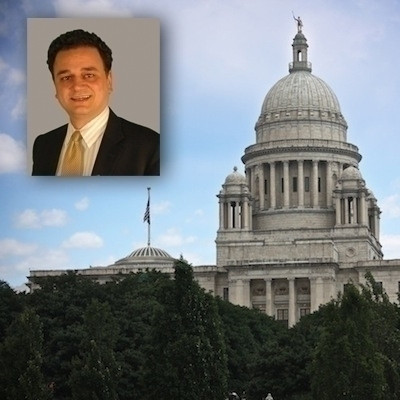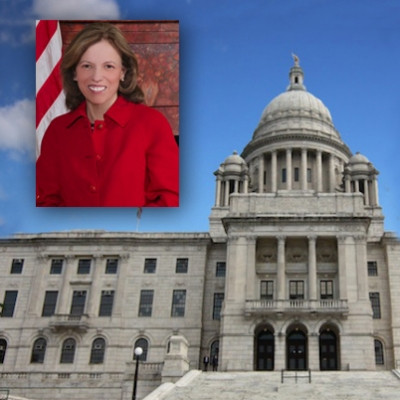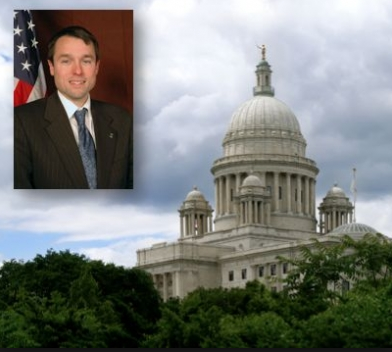Gary Sasse: Deep in Debt in the Ocean State
Wednesday, February 12, 2014
Governor Chafee is recommending that the General Assembly authorize new public debt in excess of $475 million. This includes $275 million in general obligation debt that will require voter approval. A total of $95 million would be for historic tax credits, state government information technology and facility renovations at the Pastore Government Center. The Governor is also proposing $60 million in revenue bonds for airport improvements and $45 million for a parking facility at the Garrahy Courthouse in Providence.
How much additional debt can Rhode Island’s taxpayers afford? A 2013 report prepared by Moody’s Investors Service found that the Ocean State’s per capita tax- supported debt was the tenth highest among the 50 states. In fact, it was 47 percent above the national mean. Moody’s also reported that Rhode Island’s tax- supported debt as a percentage of personal income was 13th highest in the nation.
This column focuses on the affordability and need of the four referenda questions with a cost of $275 million that the Governor proposed be placed on the November 2014 ballot.
GET THE LATEST BREAKING NEWS HERE -- SIGN UP FOR GOLOCAL FREE DAILY EBLASTWhich Referenda Would Really Help RI?
A $125 million bond issue is being recommended for higher education. The proceeds would be used for the renovation of existing higher education facilities and the construction of additions to URI’s College of Engineering. This bond referendum is a “no brainer”. World class engineering and technology infrastructure is essential if Rhode Island is to be economically competitive.
A $75 million bond is proposed for a variety of clean water, open space and community enhancement projects. This bond referendum includes $20 million for loans to be issued by the Clean Water Finance Agency for municipal wastewater infrastructure projects. Another $15 million would fund grants to enhance water resource programs. In addition $5 million would be for brownfield remediation projects, and over $4 million for marine infrastructure and pier development.
The balance of this $75 million bond issue, or $30 million, would be allocated to eleven programs whose costs range from one-half to $4 million. These smaller projects should be funded on a “pay as you go” basis. Why should taxpayers pay interest on programs that cost as little as $500,000?
A third bond referendum would support improvements to the mass transit hub infrastructure. A legislative staff report noted: “The Public Transit Authority, Department of Transportation and the Division of Statewide Planning are conducting a comprehensive operational analysis to determine if the current transit hub system is the most efficient structure.”
The RIPTA transit center at Kennedy Plaza is an impediment to rebirth and renewal in the Capitol City. Before a $40 million request is put on the ballot the General Assembly should set forth the specifics of the improvement plan as well as how it will impact RIPTA riders, intermodal transportation and downtown redevelopment.
Finally, the Governor has proposed a $35 million general obligation bond to support art and cultural programs. Monies from this bond issue would be available for the preservation and renovation of public and non-profit performance centers, historic sites, and museums and cultural centers.
Using public monies for unidentified private purposes is a dangerous precedent. If the General Assembly decides to place this proposal on the ballot they should first identify the organizations that will receive the public largess and how much.
Key Questions
To monitor state debt the Rhode Island Public Finance Management Board has adopted affordability guidelines. These guidelines provide that tax- supported debt should not exceed 5.0 to 6.0 percent of personal income, and annual debt service should not exceed 7.5 percent of general revenues.
Over the next five years the State’s debt requirements should generally meet these guidelines. However, the House Fiscal Advisory Staff noted that between Fiscal Year 2014 and Fiscal Year 2019 “debt service as a percent of useable general revenue peaks at 7.6 percent, before dropping back to 6.7 percent in FY 2019.” This suggests that taxpayers should take a cautious approach when considering referenda that would authorize new debt.
Voters should give serious consideration to the following questions when deciding whether to authorize additional tax- supported debt.
Given limited resources, should a priority be given to bond issues that will enhance economic development and get people back to work?
-Would the additional debt service costs be better used to fund operating programs such as early childhood education, phasing out the motor vehicle property tax or new workforce development efforts?
-Is the General Assembly providing complete information in a transparent manner on each ballot question?
-Do the benefits outweigh the costs of the project when interest payments are considered?
-Given the current regional economic outlook, is the project timing and pricing structure optimal?
-What are the “opportunity costs” if the bond referenda are not successful?
As Alan Greenspan, the former Chairman of the Federal Reserve Bank said, “Any informed borrower is simply less vulnerable to fraud and abuse.”
Gary Sasse is Founding Director of the Hassenfeld Institute for Public Leadership at Bryant University. He is the former Executive Director Rhode Island Public Expenditure and Director of the Departments of Administration and Revenue.
Related Slideshow: 7 Strategies for Rhode Island Economic Development in 2014
What will it take to move the Rhode Island economy forward in 2014? GoLocal talked with elected officials, candidates, and leaders for their economic development plans in the coming year.
Below are key elements of the economic priorities for Governor Lincoln Chafee, Speaker of the House Gordon Fox, Senate President M. Teresa Paiva-Weed, House Minority Leader Brian Newberry, gubernatorial hopefuls General Treasurer Gina Raimondo and Ken Block, and RI Center for Freedom and Prosperity's Mike Stenhouse.
Related Articles
- Gary Sasse: Rekindling the American Dream in Rhode Island
- Gary Sasse: Rhode Island’s Tale of Two Crises
- Gary Sasse: 3 Ways to Restore Confidence in RI’s Government
- Gary Sasse: Rudderless in the Ocean State
- Gary Sasse: Grading the Governor’s Fiscal Stewardship
- Sasse: Vote Questions If Higher Taxes Result In Better Schools
- Gary Sasse: Gubernatorial Leadership—The Defining Issue in 2014
- PowerPlayer: Gary Sasse
- Gary Sasse: Is It Time For Truth In Taxation?
- NEW: Sasse Says ‘Zero Evidence’ 38 Studios Default Would Have Long-Term Harm
- Gary Sasse: Is RI’s Tax Climate Really The 5th Worst?
- Guest MINDSETTER™ Gary Sasse: Connecting the Dots in the Ocean State
- Gary Sasse: Is a Constitutional Convention Really Needed?
- Gary Sasse: RI’s Leaders Need To Connect The Dots

















